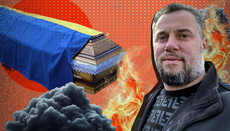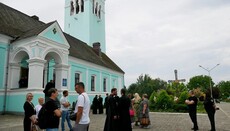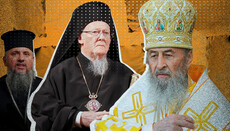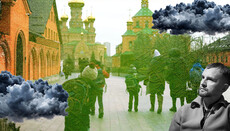Will there be bolshevist take-over in the religious sphere of Ukraine?
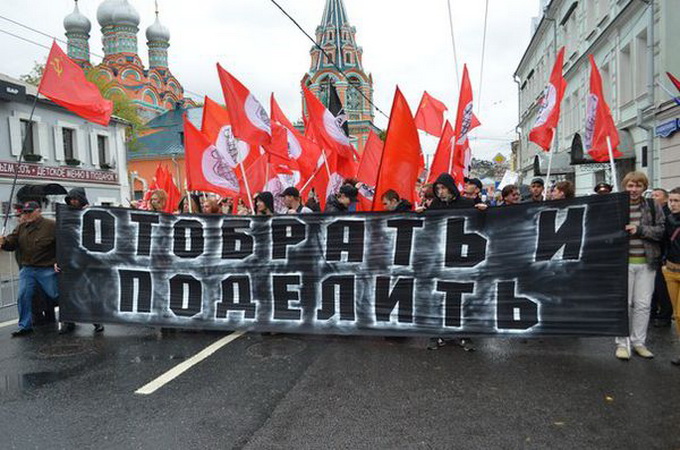
This is not an exaggeration in the least. Lawyers, religious experts, politicians, representatives of various religious organizations gave a sharp negative response regarding this “legislative” initiative. Even the VR Profile Committee that gave a preliminary assessment of the document recognized it as anti-constitutional.
If we briefly characterize this bill on the merits – it is aimed at simplified church raiding by the Kiev Patriarchate. It is the UOC-KP that appears a main beneficiary thanks to this legislative “swindle”. In more comprehensive terms, this law will enable the power to exercise its pressure on any religious organization in Ukraine.
By what means? By means of distorting and blurring the notion of the religious community member.
Fancy any state, commercial or public organization. Their staff must observe definite by-laws, which violation poses to them a risk of being dismissed (excluded, expelled, deprived of membership). This logic is universal and draws on elementary common sense which is clear even to a schoolchild.
The same logic can be applied to any religious institution. Any confession, church, denomination has their regulations to be followed by its believers. In case they violate these rules, the organization is in a position to excommunicate negligent parishioners from the Church. Afterwards they get deprived of any rights and privileges, including the property ones. For instance, the Catholic Church in Germany can excommunicate its parish members from the Church for the church tax debt and deny them Communion and other Church Sacraments.
The initiators of draft law 4128 decided to turn this rationale upside down. In their vision, it is not an organization that must determine its members, but any individual can declare himself a member of this organization as long as he “identifies himself” with it.
Just fancy the following situation: your neighbor was fired for violation of the labor discipline. But he continues to go to this work and demand a salary, because he continues to “identify himself” with his workplace. It looks even more ridiculous if some Ukrainian citizen wants to identify himself with members of the Parliament, to come to the Verkhovna Rada and declare about his right to adopt draft laws.
Nevertheless, the authors of the aforesaid bill (primarily Greek-Catholic) decided to rob religious organizations of opportunity to establish their own order and membership criteria in their communities. It appears now that the state (in the person of its civil servants) will resolve who will participate in the community’s religious life and who will not. It’s fully evident such an approach contradicts the basic principles of freedom of faith.
The draft law poses a threat not only to the Ukrainian Orthodox Church but also to the rest Ukrainian confessions. For instance, secretary of the Lutheran Church Igor Rudzik spoke about a controversy between the above draft law and his confession’s charter: “They suggest that the affiliation of personality to a whatever religious community is to be determined via self-identification with this religious community. But this statement runs counter to our charter! Further on it is said that self-identification is confirmed by the actual participation in the community’s religious sphere. Yet the “religious life” is an ambiguous notion. Is it restricted to just participation in divine worships or does it also require a mandatory participation in other spheres of life of the community?”
The UOC Statute enshrines all obligations of parishioners: “Each parishioner must regularly take part in divine worships, confess and commune, observe church canons and prescriptions, make deeds of faith and strive for spiritual and moral perfection” (Section VIII B, Para 2).
A supreme administrative body of parish is a Parish Assembly: “Parish Assembly shall be composed of clergymen and priests, parish founders, as well as laymen, members of the given parish who participate in a liturgical life of the parish on a regular basis, possess a distinctive Christina virtue, come of age, not anathematized, or brought up for trial by the church or criminal court of general jurisdiction” (Section VIII Г, Para 3).
Para 6 of the same Section reads as follows: “In the event of violation by members of the Parish Assembly of canons and maxims of the Ukrainian Orthodox Church, the composition of the Parish Assembly can be partially or fully changed upon a decision of the Diocesan Bishop.” Para 7, Section VIII points to the fact that “Parish implements decisions of the Diocesan Assembly, Diocesan Council, and Diocesan Bishop.”
What does it mean? If some share of the UOC parishioners decides to disaffiliate, which is the gravest violation of the Church dogmata, they lose their right to vote in the Parish Assembly and to be members of the UOC community. Herewith nobody deprives them of their right to register their own community within the Kiev Patriarchate jurisdiction if they are willing to.
The UOC Statute almost coincides with similar statutes or charters of other Orthodox Churches. For instance, the Statute of the Orthodox Church of America clearly says: «The Orthodox Church in general and The Orthodox Church in America in particular are hierarchical in structure». It means a congregation (parish) does not exist on its own but is subject to the authority of higher rank bodies (diocese, metropolis, patriarchy).
Section 12, Para 1a states: The parish is a local Orthodox Eucharistic community canonically established by and subject to the authority of the Diocesan Bishop.
Hierarchy is a distinctive feature of any organization. However, draft law 4128 is targeted at destroying a hierarchical structure of the UOC, which was noted by Head of the UOC Law Department Archpriest Alexandr Bakhov.
The Statute of the Orthodox Church of America also secures duties and obligations of a parishioner, which are similar to those of the UOC Statute plus an obligation “to confess Orthodox Faith, to live according to the teaching of the Church, to participate in religious service, to do works of Christian mercy, to support the Church and to help it.”
Membership in the American Orthodox Church can be suspended or abolished in the event of: “Public refusal from Orthodox faith, public and overt slander, disobedience, rebel against church authorities, moral actions, transition to a non-Orthodox religious organization.” The right to participate in voting is also clearly stipulated there.
Not less clear-cut rules are established with regard to property issues. For instance, in case a separate parish or a diocese disaffiliates (changes its affiliation), the right to property, use, disposal of its property is vested in the Diocese or Metropolis of the Orthodox Church of America: “In the event the Diocese shall be dissolved or attempt to disaffiliate from The Orthodox Church in America in a disorderly manner, all parish property, assets and funds of such Diocese are and shall remain subject to the use, purpose, and benefit of The Orthodox Church in America”.
As we can see, in the Orthodox Church, like in any other organization, everything is consistent and logical. If a part of the congregation of some parish starts to rebel against their clergy and organizes arbitrary meetings, it loses its right to be considered members of this parish. At the same time their quantity does not matter at all. If the there is a certain part of believers left with the UOC parish (moreover if there is a priest left), the parish continues to exist as a canonical unit and a legal entity. All the church movable an immovable shall be in use and purpose of the UOC parish. There can be no question of “split” or “ambivalence” of the community. The right description of this process will be “exit of part of parishioners from the UOC community”. The remaining expressions are more suitable for NLP psychic techniques and juridically incompetent persons.
However, the Ukrainian power is determined to destroy or weaken the Ukrainian Orthodox Church. For this end it needs legalization of the raiding mechanism that would enable, firstly, take the UOC communities off the registration in case the majority of parishioners intended to pass to the Kiev Patriarchate. Herewith nobody takes it into account whether these parishioners observed the Church canons, the UOC Statute, or not. Only their desire matters. Secondly, all the church property is transferred to the Kiev Patriarchate. Therefore, the bill kills two birds with one stone: elimination of the UOC community as a legal entity and dispossession of its property. Given that the UOC faithful are further denied a land plot for a new church construction, then it means total elimination of the UOC communities.
From the juridical perspective this is erroneous logic. Church lawyers told about it a long time ago. It is also clear from the standpoint of elementary logic. Let’s emphasize it once again that draft law #4128 refuses the Church in regulation of its community membership and recognizes as the community members those people who believe themselves to be its members (“self-identification”). The right to define a degree of their performance in the church life is for some reason transferred to functionaries. Obviously, in this case the role of the top church hierarchy is reduced to zero. Hierarchical structure of the religious organization is abolished altogether. Needless to say this is the most flagrant infringement of the right to freedom of faith and the right to found associations according to one’s own discretion. To say it in a straightforward way – this is total lawlessness.
In our case, when potential schismatics joined the UOC community, they agreed to follow church prescriptions, canons, obey a father superior and diocesan administration. Besides, they gave their consent that in the event of violation of church regulations they would be deprived of their membership in the community. But our state has a different opinion on this matter: it makes no difference whether you attended the Church, regularly had Communion, observed dogmata and charter, fulfilled all instructions of the clergy etc. It’s sufficient to merely consider yourself a member of the community and – presto – you enjoy the right to all its property, as well as possibility to wipe out your undesirables. Isn’t it a fantastically “freebee” prospect?
Let’s come back to analogies. Fancy that your neighbor has been made redundant for stealing a particularly large sum of money at his workplace. However, a civil servant comes and says he cannot be fired and it makes no difference what mess he has made. On top of that, thanks to this employee the organization gained some profit, so it has to be returned to him, for instance, this office, which has been bought with this money. This is nothing else but typical bolshevik reasoning – to grab and to divide.
Bolsheviks denied the right to private property. From their point of view, laborers enjoyed the right to the entire profit gained by their labor, without any intermediaries. This rejection of intermediary bodies, hierarchy, and different status is a notorious Communism-Bolshevism modern “de-communizers” are opposed to. “All the power to communities”, “churches – to believers”, “our goal is a single theological collective farm” – here are the Communist slogans, translated in the church terms.
If MPs dare vote for this draft law, it’ll mean there is no rule of law in our country and a comeback to the Bolshevist revolutionary anarchy. If they do not stop at nothing to destroy the Church, will they be able to stop before they destroy “undesirables”?
0
0
If you notice an error, select the required text and press Ctrl+Enter or Submit an error to report it to the editors.
Read also
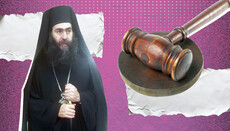
Bishop and secular justice
16 January 17:29
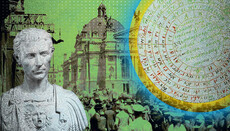
Why Lviv residents once defended “Muscovite” Christmas
15 January 13:55






